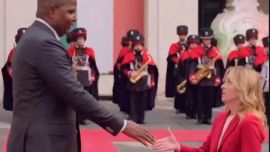Just over a century ago, when the Spanish Flu (which probably got underway in a military camp in Kansas), was working overtime for the grim reaper and ended up by shortening the lives of 20 million people, among them 600,000 in the US, that country’s president, Woodrow Wilson, did not even bother to mention the pandemic that was raging around him. His silence did him no harm; in those days people did not expect their rulers to get everything right all the time, so his failure, and that of most other public officials, to at least suggest that it might be a good idea for his compatriots to avoid large crowds, did not affect his reputation as a good-hearted man who got things done.
Since then, much has changed. Office-holders, especially those regarded as hopelessly reactionary and therefore beyond redemption, know that their every word will be “fact-checked” by ideological foes determined to trip them up. To make their situation even worse, information is far more widely shared than it was when Wilson was in the White House, so it is easy to compare their performance with that of their counterparts elsewhere, as so many are happily doing.
In today’s world, there are countless electronic devices which are able to provide us with up-to-the-minute reports about what is happening in other countries, no matter how far away they may be. Even in poor countries, there can be as many smartphones as people. This has its advantages, especially in times when physical proximity is frowned upon, but it also makes it easier to spread panic. News organisations have no choice do their best to meet the insatiable demand for items – preferably alarming ones, related to the pandemic – with the result that the death of an apparently healthy 15-year-old who contracted the coronavirus gets worldwide coverage and is taken by many who live thousands of miles away to mean that it would be foolish to trust statistics showing that all but a few individuals under 50, of whom most already suffered from a life-threatening illness of one kind or another, manage to survive.
As Argentina’s much-criticised Health Minister Ginés González García likes to point out, there is no way of knowing just how lethal the virus is because only a fraction of the people carrying it has been properly tested. This is true not only here but also in all other countries, even South Korea. Like many epidemiologists in Argentina and elsewhere, the minister suspects that the true number could be many times higher than the ones making the headlines. This matters; there is a huge difference between the World Health Organisation’s estimate that almost four percent of the people who catch the virus will die and the considerably less than one percent of the UK government’s medical advisors who also point out that – though the octogenarians who get it are in for a tough time – most will suffer no more than a relatively mild fever. What is more, some spry centenarians have left hospital in almost as good a shape as when they entered.
González García is in the doghouse because when the virus made its first appearance he thought it would take its time to reach Argentina and, in any case, would be no more dangerous than some of the nasty pathogens which are killing people in various parts of the country, including Buenos Aires Province. Barely a month ago, his view was shared by most people, including experts and pundits who are currently berating the politicians they most dislike for not ordering a complete lockdown on getting word that something extremely unpleasant was brewing in Wuhan.
The favourite target of these allegedly far-sighted commentators is Donald Trump. When he slapped travel restrictions on people coming from China, they loudly accused him of “racism” and attributed a similar move to stop Europeans coming in to his nationalistic prejudices despite the fact that by then most countries, including the ones in the until then borderless Schengen Area, were doing much the same.
Also coming in for a fair amount of politically-motivated flak is Boris Johnson, who, like Trump, is regarded by many influential media outlets as an incorrigible right-winger who is only interested in money. They assume that a US government headed by Joe Biden, who to judge from his behaviour is in his dotage, or a British one under Jeremy Corbyn, would have been quicker off the mark and have lost no time in coming to the conclusion that voluntary social distancing would not be enough.
So far – much could change in the coming hours or days – Argentina has had fewer fatalities than in many other countries or are caused here by a host of ailments whose inroads we all take for granted. What is more, up to now most politicians, apart from the usual suspects, have resisted the temptation to “weaponise” the virus in an attempt either to blame Mauricio Macri for not having given the country a world-class health service or to discredit the Peronist government and, by so doing, undermine public confidence in the way the local authorities are handling the pandemic. It is generally agreed that, until the emergency is over, it will be better to give President Alberto Fernández and his team the benefit of the doubt, unless they start making decisions that could have ruinous consequences.
Ensuring that the truce lasts until something like normality has been restored should be an official priority; unless it does, what is an already difficult situation would be certain to get a great deal worse. However, there are disquieting signs that, as the quarantine drags on, tempers are fraying not only among people who are fed up with being cooped up in their flats or, if they are lucky, houses (who are letting off steam by cheering on the medics they see out in the streets, or beating pots and pans in an attempt to get politicians to agree to a big pay cut), but also in government circles.
By going on about what to him is the despicable selfishness of CEOs who lay off workers, Alberto risks putting an end to the largely positive mood he himself had encouraged by working alongside senior opposition figures. In the present circumstances, picking a fight with the already hard-pressed business community – in which many fear that the anti-capitalist wing of the ruling coalition thinks the coronavirus has given it a chance to put the chronically anaemic private sector out of its misery – is not very helpful.























Comments